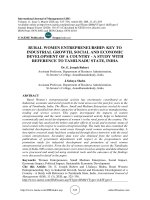Economic growth and economic development 174
Bạn đang xem bản rút gọn của tài liệu. Xem và tải ngay bản đầy đủ của tài liệu tại đây (82.99 KB, 1 trang )
Introduction to Modern Economic Growth
set of beliefs that have evolved over time and outside the direct control of individuals.1 Even though institutions might be hard to change in practice, culture is much
harder to influence, and any advice to a society that it should change its culture is
almost vacuous.
In the rest of this chapter, we will discuss each of these four explanations in
greater detail. We will explain what the reasoning for these different hypotheses are
and provide a brief overview of the empirical evidence pertaining to various fundamental causes of economic growth. The theoretical underpinnings and implications
of the institutions view will be further developed in Part 8 of the book. At this
point, the reader should be warned that the author of this book is not an objective
outside observer in this debate, but a strong proponent of the institutions hypothesis. Therefore, not surprisingly, this chapter will conclude that the institutional
differences are at the root of the important proximate causes that we have already
listed. Nevertheless, the same evidence can be interpreted in different ways and the
reader should feel free to draw his or her own conclusions.
Before delving into a discussion of the fundamental causes, one other topic deserves a brief discussion. This is where we start in the next section.
4.2. Economies of Scale, Population, Technology and World Growth
As we have emphasized in Chapter 1, cross-country income differences result from
the differential growth experiences of countries over the past two centuries. This
makes it important for us to understand the process of economic growth. Equally
remarkable is the fact that world economic growth is, by and large, a phenomenon
of the past 200 years or so. Thus another major question concerns why economic
growth started so recently and why there was little economic growth before. The
growth literature has provided a variety of interesting answers to this question.
Many of them focus on the role of economies of scale and population. The argument goes as follows: in the presence of economies of scale (or increasing returns to
scale), population needs to have reached a certain critical level so that technological
1A major and important exception to this is the effect of education on the beliefs and values
of individuals.
160









